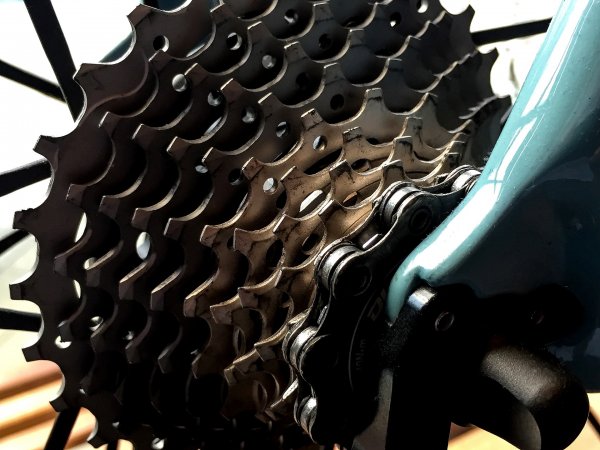If you need a new chain as a replacement, you may be wondering if just any chain will do, or if there is a specific one for each bike…
Can you use any chain on a bike?
No, you can’t simply switch out any chain for any bike, although you can certainly try and they MIGHT be compatible. The reason for this is that modern bicycles are all made to a standard of a one-hitch pitch, which simply means that there is a half-inch space from rivet to rivet.
In turn, the socket teeth are indeed cut to fit this, but there are many makes and models of chains out there, so even though they all follow the same standards, there is no guarantee that the chain from another bike is going to fit your own.
Will any chain fit any sprocket?

Yes, as chains use a .5-inch standard measurement for the space between rivets, any chain will indeed fit any standard socket. That’s no guarantee that it’s going to work with your bike, however, so this is something that you’ll want to keep in mind.
There are simply too many chains out there and bike designs to guarantee 100% compatibility.
Can I use an 8-speed chain on a 7-speed bike?
Yes, you should likely be able to use it, provided that it is a 7.1 mm wide chain for an 8-speed. If this is the case, then it has ‘backward compatibility’ as far as the speeds are concerned. Thus, that 8-speed chain will also be able to fit a 7, 6, and 5-speed.
For instance, this would interchangeable on Campagnolo and Shimano bikes, as they employ the same type of chain, but keep in mind that there is no 100% guarantee on this – with a very obscure model bike there is still going to be a chance of incompatibility.
You can always check with the vendor, however, as they might have a compatibility list already compiled for you so that you’ll know in advance if it’s going to work.
How do I know what bicycle chain to buy?
It’s a good idea to take a closer look at the sprockets on your bike. On the rear of the bicycle, you’re going to find that your bike is made with anywhere from 5 up to 12 sprockets.
This is an important consideration, as the higher, the sprocket count is, the less spacing there is going to be with the cogs to keep the design as thin and streamlined as possible, while also reinforcing the integrity of the cog array.
Write this down and bring the information with you when you go to purchase your new chain, along with the make and model of your bike, and you should have all that you need to purchase the correct chain for your bike.
How do I know my chain size?
You’re going to need a set of calipers, as this is going to help you to determine the pitch and chain size for your bike. From center to center, where the teeth will be meeting the rollers, you’ll want to employ your calipers to measure the space. This gives you the pitch.
Next, use the calipers to determine the amount of space between the teeth on your sprocket. With the pitch and the chain size measured, you should be able to use those measurements to purchase the correct chain.
How much is a new chain for a bike?
That’s going to depend on how fancy your bike is. High-performance models, for instance, might have chains that will cost you anywhere from $25 up to $60. By contrast, ‘entry-level’ bikes that are less complicated in their performance features might cost you as little as $25 for a replacement chain.
The good news with the more expensive chains is that they tend to be of higher quality, so they will last considerably longer than those entry-level chains.
How long do bike chains last?
On average, most bike chains (provided that you are taking care of them) are going to last for an estimated 2000-3000 miles. Some higher-end chains will promise more mileage, but 2000 – 3000 miles is what you should generally expect from a brand-new chain that you are properly maintaining.
When should I replace my bike chain?

This will depend on your bike. For instance, for single sprocket and single speed bikes, you’ll typically want to replace the chain when it has reached a 1% wear mark from your usage. For a bike that has a gear count of 10 or less, then you can replace the chain when it reaches a level close to 75% wear.
For an 11 or a 12-speed model, you can replace it once it has reached approximately 5% wear and this is going to be optimal. With other models that we have not mentioned, it is best to check with the manufacturer for a list of their approved and compatible chains.
How often should I lube my bike chain?
If you are an active biker, then it’s a good idea to have a rule for yourself that you will clean and lubricate the drive chain at a minimum once-a-month frequency. This will help to keep you safe and to ensure that you are getting the best performance out of your bike.
If you are an active biker and frequently ride through dusty areas such as trails, then twice a month might be a better fit to keep the drive chain clean and lubricated, but at the very least you’ll want to do it once a month.
Is WD40 OK for bike chains?
WD40 has a good reputation that it has earned over the years. It’s a great water-based lubricant that is perfectly safe to use for cleaning and lubricating your bike chain.
As a bonus, it will also keep corrosion from rust at bay and the thin film of this lubricant also helps to minimize the dirt that can accumulate with regular use.
You should always keep 2 cans of this, however, as you’ll find that it has several other uses aside from your bike chain that you can take advantage of!